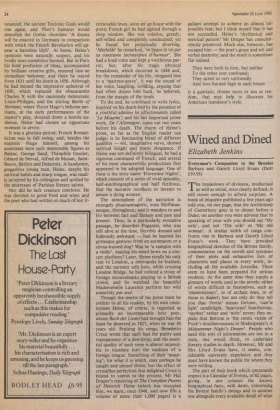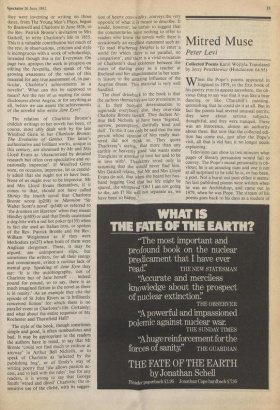Wined and Dined
Elizabeth Jenkins
The breakdown of divisions, intellectual as well as social, once clearly defined, is still recent enough to afford surprises. A book of etiquette published a few years ago told you, on one page, that the Archbishop of Canterbury goes in to dinner before a Duke; on another you were advised that in speaking of your wife you should say 'My wife', and not 'The wife' or 'My old woman'. A similar width of range con- fronts one in Barbara and Gareth Lloyd Evans's work. They have Provided biographical sketches of the Bronte family, commentaries on the novels and synopses of their plots and exhaustive lists of characters and places in every work, in- cluding all the available Juvenilia. These seem to have been prepared for serious students. At the same time they supply a glossary of words used in the novels: either of words difficult in themselves, such as 'eleemosynary', or of archaic ones, or of those in dialect; but not only do they tell you that 'fortin' means fortune, 'can'le light' candlelight, teartstun' hearthstone, `rayther' rather and `nivir' never; they ex- plain that Bottom is 'the comic victim of Puck's mischievousness in Shakespeare's A Midsummer Night's Dream'. People who need this sort of information are not in a state, one would think, to undertake literary studies in depth. However, Mr and Mrs Lloyd Evans have, it seems, con- siderable university experience and they must have known the public for whom they were writing.
The part of their book which commands respect is a Calendar of Events, of 62 pages, giving, in one column the known biographical facts, with dates, concerning the Bronte family's doings and in another one alongside every available detail of what
they were inventing or writing on those dates, from The Young Men's Plays, begun by Bramwell and Charlotte in June 1826, to the Rev. Patrick Bronte's invitation to Mrs Gaskell, to write Charlotte's life in 1855. This is a valuable contribution but much of the rest, in observations, criticism and style is incongruous with a work of scholarship, intended though this is for Everyman. On page two, apropos the work in progress on editing the Juvenilia, they speak of 'the growing awareness of the value of this material for any true assessment of, in par- ticular, Charlotte's achievements as a novelist'. What can this be supposed to mean? Are the rest of us waiting for some disclosures about Angria, or for anything at all, before we can assess the achievements of the novelist who wrote Jane Eyre?
The relation of Charlotte Bronte's childish writings to her novels has been, of course, most ably dealt with by the late
Winifred Gerin in her Charlotte Bronte: The Evolution of Genius. The latter's authoritative and brilliant works, unique in this century, are dismissed by Mr and Mrs Lloyd Evans as 'characterised by detailed research but often over-speculative and oc- casionally imprecise'. If Winifred Gerin were, on occasion, imprecise, let us candid- ly admit that she ought not to have been. None of us ought ever to be imprecise. Mr and Mrs Lloyd Evans themselves, if it comes to that, should not have called Shirley the fourth novel that Charlotte Bronte wrote (p258) or Marmion 'Sir Walter Scott's novel' (p340) or referred to 'the drunken sot Hareton' when they meant Hindley (p305) or said that Emily cauterised a dog-bite with a red hot poker (p135) when in fact she used an Italian iron, or spoken of the Rev. Patrick Bronte and the Rev. William Weightman as if they were Methodists (pl 27) when both of them were Anglican clergymen. These, it may be argued, are unimportant slips, but sometimes the writers, for all their energy and commitment, evince a curious lack of mental grip. Speaking of Jane Eyre they say: 'It is the autobiography, not of Charlotte but of Jane herself ... indeed pound for pound, so to say, there is as much imagined fiction in the novel as there is in reality.' As an example they cite the episode of St John Rivers as 'a brilliantly conceived fiction' for which there is no parallel event in Charlotte's life. Certainly; and what about the entire sequence of Mr Rochester and Thornfield Hall?
The style of the book, though sometimes simple and good, is often rumbustious and bad. It may be appropriate to the readers the authors have in mind, to say that Mr Bronte 'could not find much to enthuse at anyway' in Arthur Bell Nicholls, or to speak of Charlotte as 'infected by the publishing bug', or of Emily's way of writing poetry that 'she allows passion ac- cess, and to hell with the rules' ; but for any readers, it is wrong to say that George Smith 'wined and dined' Charlotte; the in- sensitive use of the cliche, with its sugges- tion of hearty conviviality, conveys the very opposite of what it is meant to describe. It would, however, be unfair to suggest that the commentaries have nothing to offer to readers who know the novels well; there is occasionally an excellent statement such as: `To read Wuthering Heights is to enter a world for which there is no parallel, no comparison', and there is a vivid evocation of Charlotte's dual existence between the states of slaving away as a teacher at Roehead and her abandonment in her scan- ty leisure to the amazing influence of the Angrian dream. This material is very well handled.
The chief drawback to the book is that the authors themselves are too prominent in it. In their buoyant determination to supersede everybody else, they over-ride Charlotte Bronte herself. They declare Ar- thur Bell Nicholls to have been 'bigoted, narrow, peremptory, dutifully kind and dull'. To this it can only be said that the one person whose opinion of him really mat- tered did not think so. They quote Thackeray's saying, that more than any earthly or heavenly good 'she wants some Tompkins or another to love her and to be in love with'. Thackeray erred only in assuming that she would never find him. Mrs Gaskell relates, but Mr and Mrs Lloyd Evans do not, that when she heard her hus- band begging God that her life might be spared, she whispered 'Oh! I am not going to die, am 1? He will not separate us, we have been so happy,'























































 Previous page
Previous page